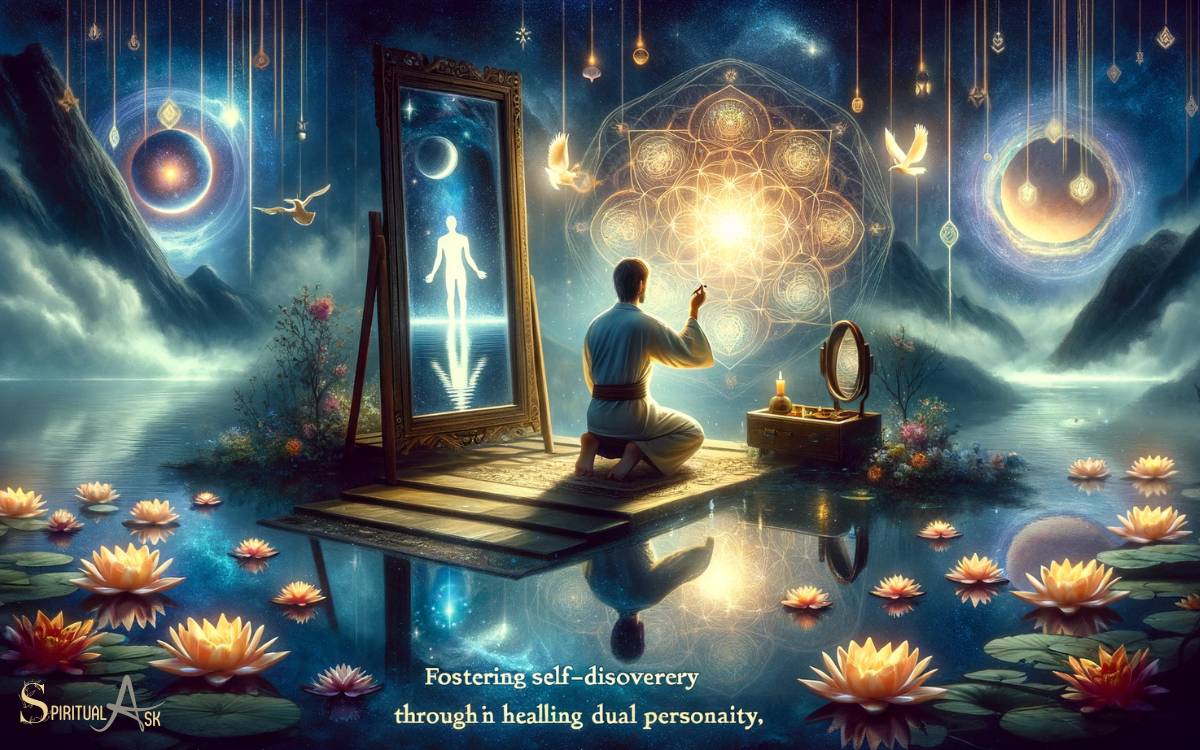Spiritual Healing for Bipolar Disorder: Meditation!
Spiritual healing can be a valuable complementary approach for individuals managing bipolar disorder.
While it is not a substitute for medical treatment, incorporating spiritual practices such as meditation, mindfulness, and energy work can promote mental and emotional well-being, offering a sense of peace and self-awareness which can be beneficial alongside traditional therapies.
Spiritual healing encompasses a range of practices aimed at nurturing the soul or spirit.
Such practices may include:
It’s important to note that spiritual healing should complement, not replace, conventional bipolar disorder treatments.
Spiritual healing offers an additional layer of support, fostering tranquility and resilience in the face of bipolar disorder.

Key Takeaway
4 Spiritual Healing Practices for Bipolar Disorder
| Spiritual Practice | Description | Potential Benefits for Bipolar Disorder |
|---|---|---|
| Meditation | A practice of focused attention and contemplation. | Reduces stress, improves emotional regulation, enhances self-awareness. |
| Mindfulness | Being fully present and engaged in the current moment. | Helps with grounding, reduces rumination, and fosters acceptance. |
| Energy Healing | Techniques such as Reiki that works with the body’s energy fields. | Promotes relaxation, aids in releasing emotional blockages. |
| Prayer/Faith-Based Activities | Involvement in religious or spiritual rituals. | Provides a sense of community, increases hope, and offers spiritual support. |
Understanding Bipolar Disorder and Spirituality

I have come to understand the intersection of bipolar disorder and spirituality through personal experience and extensive research. Living with bipolar disorder, I’ve encountered moments of intense spiritual connection as well as profound existential despair.
This condition, characterized by extreme mood swings, challenges one’s sense of self and purpose. In my journey, I’ve found that spirituality can provide solace and a sense of grounding during tumultuous times.
It’s not about religious dogma, but rather the quest for meaning, peace, and inner balance. Research supports the idea that practices like meditation, mindfulness, and finding a supportive community can complement traditional treatments for bipolar disorder.
Spirituality, in this context, isn’t a panacea, but it can be a valuable tool for cultivating resilience and finding deeper understanding amidst the challenges of bipolar disorder.
Incorporating Meditation for Inner Peace

When incorporating meditation for inner peace into my bipolar disorder management, mindfulness has become a crucial practice for finding stability and calm amidst the emotional turbulence.
Through meditation, I have discovered a tool that allows me to observe my thoughts and feelings without getting caught up in them. This has been immensely helpful in managing the fluctuations of bipolar disorder.
Here’s a simple meditation practice that I find beneficial:
I understand now that you’re looking for a meditation practice that you find beneficial, and it involves creating a mental image of a standard table. Here’s a simple meditation practice based on your request:
- Find a Quiet Space: Choose a quiet and comfortable place where you won’t be disturbed for the duration of your meditation.
- Sit or Lie Down: Sit in a comfortable chair or on a cushion on the floor, or you can even lie down on your back. Keep your back straight if sitting.
- Relax: Close your eyes gently and take a few deep breaths to relax your body and mind.
- Visualize the Standard Table: Now, imagine a standard table in your mind. Picture it as vividly as you can, with all its details such as its shape, size, color, and any decorations it might have.
- Focus on the Table: Direct your full attention to this mental image of the table. Try to keep your mind from wandering by concentrating solely on the table.
- Breathe Mindfully: While focusing on the table, pay attention to your breath. Feel the natural rhythm of your breathing without trying to control it. If your mind wanders, gently bring your focus back to the table and your breath.
- Maintain for a Set Time: You can choose a specific time duration for this practice, such as 5, 10, or 15 minutes, depending on your preference and schedule.
- Release and Reflect: When your chosen meditation time is up, slowly let go of the mental image of the table and bring your awareness back to your surroundings. Take a moment to reflect on how you feel after the practice.
This meditation practice combines visualization with mindfulness of breath. The table serves as a point of focus to anchor your attention and bring about a sense of calm and presence.
You can customize it to your liking and experiment with different objects or scenes in your visualization if the table doesn’t resonate with you.
Practicing Mindfulness for Emotional Balance

Incorporating mindfulness into my daily routine has been essential for maintaining emotional balance while managing the fluctuations of bipolar disorder. Being mindful means paying attention to the present moment without judgment.
When I practice mindfulness, I focus on my breath, bodily sensations, and the thoughts and emotions that arise. This helps me become more aware of my internal experiences and better equipped to handle the highs and lows of bipolar disorder.
Mindfulness allows me to observe my emotions without becoming overwhelmed by them. I’ve learned to acknowledge my feelings without necessarily reacting to them, which has been incredibly empowering.
It’s not about ignoring or suppressing emotions but rather about approaching them with a sense of curiosity and acceptance. Mindfulness has become a powerful tool in my journey towards emotional balance and stability.
Harnessing Energy Healing for Wellness

Practicing mindfulness has allowed me to explore the potential benefits of harnessing energy healing for maintaining wellness in managing bipolar disorder.
Energy healing techniques have provided me with an additional tool for promoting balance and stability in my life.
Here are four ways in which I have found energy healing to be beneficial:
- Chakra Balancing: By working with energy centers in the body, such as chakras, I have experienced improved emotional regulation and mental clarity.
- Reiki Therapy: Receiving regular Reiki sessions has helped me reduce stress and anxiety, leading to more stable moods and better overall well-being.
- Crystal Healing: Utilizing crystals in energy healing practices has provided me with a sense of grounding and inner peace during turbulent times.
- Sound Therapy: Engaging in sound healing techniques, such as Tibetan singing bowl meditation, has contributed to a calming effect on my mind and emotions.
Fostering Self-Discovery Through Spirituality

Exploring spirituality has allowed me to delve deeper into self-discovery, fostering a profound sense of connection and purpose in my life.
Through spiritual practices such as meditation, prayer, and self-reflection, I have been able to uncover hidden aspects of myself and gain a deeper understanding of my inner world.
This journey has helped me to recognize my strengths, values, and true passions, leading to a greater sense of self-awareness and fulfillment.
Spirituality has provided me with the tools to navigate the complexities of bipolar disorder, offering a sense of grounding and inner peace amidst the ups and downs.
It has allowed me to embrace my experiences with a newfound perspective, empowering me to grow and evolve on a profound level.
Can Spiritual Healing and Meditation Help Manage Bipolar Disorder?
Spiritual healing and meditation can be complementary tools in managing bipolar disorder, alongside traditional treatments like medication and therapy. These practices may help reduce stress, enhance emotional balance, and improve overall well-being.
Here’s how they can help:
- Enhancing self-awareness: Meditation can increase self-understanding and mindfulness, aiding individuals in recognizing early signs of mood swings.
- Stress reduction: Both practices can lower stress levels, potentially decreasing the frequency and severity of bipolar episodes.
- Emotional regulation: Regular meditation can improve emotional stability, helping individuals manage their emotions more effectively.
Understanding spiritual warfare in bipolar involves recognizing the internal battle individuals may face and how spirituality and mindfulness can empower them to navigate their emotions and moods with greater resilience.
Important Note: While these practices are beneficial, they should not replace professional medical advice or treatment plans. Always consult with a healthcare provider for a comprehensive approach to managing bipolar disorder.
Conclusion
In the journey to healing from bipolar disorder, embracing spirituality can be like finding a hidden path through a dark forest. It may not be the easiest route, but it can lead to a sense of peace and understanding that can’t be found elsewhere.
By incorporating meditation, mindfulness, and energy healing, we can unlock the power within ourselves to navigate the ups and downs of this disorder. Embracing spirituality is like finding a guiding light in the midst of the storm.






